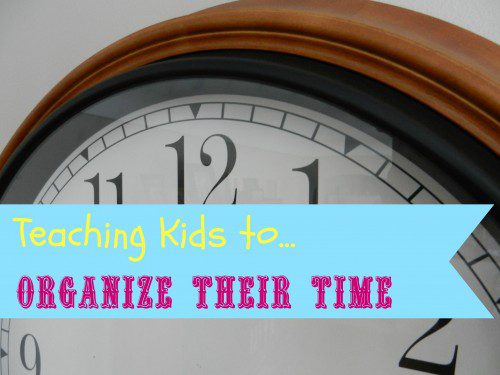The following guest post is from Kristin Sterk of Organizing Life with Less: Teaching Kids to Organize Their Time
Every night, do you battle the question with your kids: “Have you finished this?” knowing full well they have not accomplished everything they have to before bedtime?
Helping kids organize their time and teaching time management skills at a young age can happen and is feasible! Believe it or not, organizing is a learned skill. Teaching children to make the most of their time at a young age will only prepare them to take the initiative later on in life to be able to do this on their own.
Table of Contents
Where to begin?
I am going to share with you some practical and helpful tips on how to help kids get organized with their schedules and time. Some of these ideas may work better than others, but give them a try and see what your children react to the best!
1. Create a checklist.
Have your children complete a routine every night, such as their homework, picking up their toys, getting their school bags ready, brushing their teeth, etc.
2. Help your kids discover time management skills.
Before they can go and play with friends, they have to finish “this.” Before watching a favorite TV show, they must get their homework done. You don’t want your children to rush through their homework, but if they know that they have to finish it every day before they can watch TV, they will be determined to do so (the priorities of a child!).
3. Create a consistent study place, such as the kitchen table.
This way, you are most likely available if they have questions, and they are able to spread their homework out. Little do they know, too, that when they are distracted, a watchful eye (YOU), will catch them and keep them on task!
4. Keep tabs on their homework.
When they are doing their homework every day, ask them what homework they have. You could even take it a step further (depending on their age) and go through their assignments with them.
5. Have a calendar in your home that everyone can read and understand.
If you have a weekly calendar that you use, have your kids sit nearby as you fill it out and purposefully ask them what they have coming up. This helps them take ownership of their schedule (even if you know the answer to this simple question).
6. Put long-range assignment due dates on the calendar.
When filling out the calendar, if your child has a project that is going to take a while, put the due date on the calendar. This assures you AND them that it will get done. It is a helpful reminder to the child that working ahead is a tool that they will use for the rest of their life!
7. Finally, have your child pack their school bag the night before.
Working in a school, it is amazing the number of items that are forgotten at home each day! Help your child think about the day ahead and what they might need. Don’t tell them – ask them. This again gives ownership. Also, have a consistent place where they can keep their school bag, instrument, lunch, etc.
As much as parents want their children to be flexible and “go with the flow,” it is also important that they have routine and consistency. Teaching your children about boundaries, time management, and organizing their schedules will go a long way in helping them become adults. Responsible adults at that!
Check out Printable Time Management Quadrants.
What is your #1 way to help your kids get organized?
Organizing, simplifying, and DIY has become a way of life for Kristin, who enjoys them so much that she can’t help but blog about them at Organizing Life With Less. Join her in her journey to find inspiration and motivation to organize your life with less!




